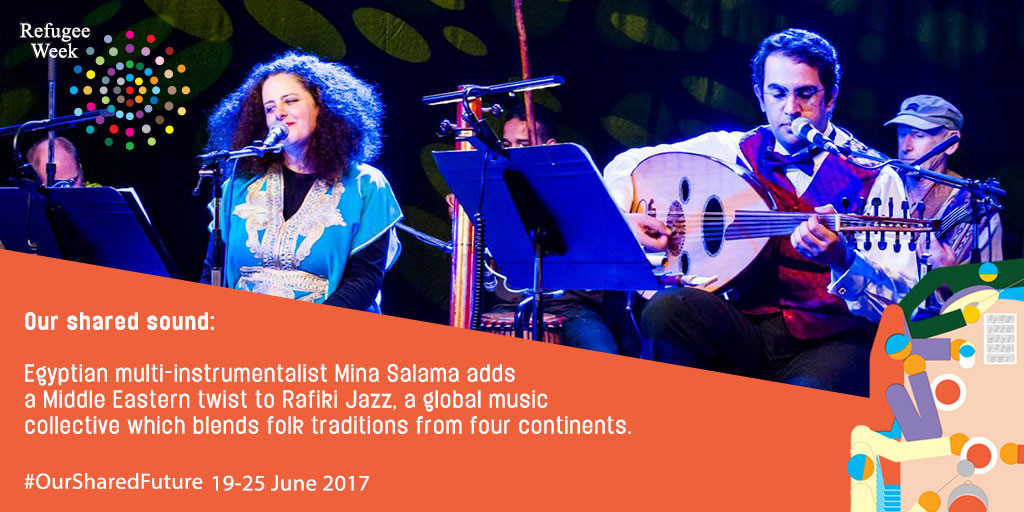In part four of the Our Shared Future blog series, Marienna Pope-Weidemann meets Egyptian instrumentalist Mina Salama, and learns about the new route his music has taken since he sought sanctuary in the UK
Mina was nine years old when he found an old keyboard at his friend’s house in Alexandria, Egypt. Enchanted, the young boy sat down to play and there was no going back. “I had found something in myself that responded to the sound of music,” he recalls. “I was always whistling, all the time and started composing music in my mind before I ever really knew what was happening.”
After saving his allowance every day for 80 days, Mina bought and taught himself to play the oud – an Arabic lute – and began performing at his local Coptic church. When school finished, he declared his intent to become a musician and successfully applied to the University of Alexandria to study musical education. Mina’s worried parents had hoped he would become a doctor or an engineer, but it was too late. Mina had found his calling and his passion for music would come to define the course of his life, including his eventual flight from persecution in Egypt.
Mina graduated from university in 2000 and after getting his Bachelor degree went onto become a teacher in the same faculty, and then a soloist in the oriental orchestra at the Egyptian Opera House for seven years. Learning new instruments was not enough to satisfy him, and he developed an avid interest in all aspects of composition, music arrangement and production. As well as playing, he also prepared scores, gave vocal coaching and worked as a composer and a Maestro assistant. He worked as a sound engineer for many professional sound studios, one of which he managed. Today, Mina also plays the piano, oriental violin, mandolin and recorder as well as an array of Middle Eastern instruments: the ney, kawala, naylute, Kanun, duduk, udu (a percussion instrument made of clay) and the saz. “Each new instrument helped me unlock the secrets of the next,” he explains, and when he speaks of them, their unique histories and sounds, he does so with something like reverence.
As the Coptic Christian community faced growing threats and persecution from Daesh and extremist elements of the Muslim Brotherhood, Mina claimed asylum in the UK in 2012. Like all Mina’s life experiences, his exile from Egypt and reunion with his family inspired music, the soundtrack for A Journey of Unbelonging: a multimedia work with Turkish performance artist Aysegul Balkose and director Paulo Simoes, commissioned by Journeys Festival International. “Music is my life, and my life’s all there in the music: fleeing Alexandria, leaving Egypt, arriving in the UK; my father passing away when of course I couldn’t go home to say goodbye, that was very hard; and then the beautiful day after I was granted refugee status, when I could bring my wife and baby daughter to safety.”
Mina now has two daughters, aged seven and four. He lives immersed in Arabic, European classical, film score and of course, the Coptic music where it all began. He composes, records and performs with The Coptic Orchestra , Manchester International Roots Orchestra (MIRO) and Rafiki Jazz, as well as with singers like Haymanot Tesfa, Paula Darwish, Mim Soliman, Sarah Yaseen, and many others at festivals and concerts across the country and Europe . He also works as a musical researcher, and helps Masters and PhD students with their studies. “Recently I received a bone flute from Huddersfield university. The original instrument was found in the Isturitz in France, is 20,000 years old, and was found in a cave that features prehistoric cave paintings, They found a link between sound and the paintings in the caves and I will play it for a BBC documentary in a cave in Spain. This is a sound not heard for many centuries, it’s very exciting.” He also hopes to return to university for a Masters degree in ethnomusicology focused on the music of ancient Egypt, to which Coptic music traces some of its ancestry. In addition, he studies music conducting in London.
Mina has performed across the country for Refugee Week every year since 2013. “I perform for audiences from everywhere and all walks of life. Music is a great language because everyone can understand it. It’s the common language of feelings and emotions,” he reflects. “And I know from experience that people across this country enjoy experiencing the music and sounds of other cultures; they are always curious about my instruments and I enjoy teaching people about them. I didn’t expect my music to touch people so much in Britain because it comes from so far away, yet what I find is that when I play, all that distance falls away and people are moved.”
The next challenge Mina has set himself is to study music therapy as a way of using his art to help people heal and find their voice. Like everything, our shared future is something Mina interprets through music. “There is a strong, growing Egyptian tradition of world music that combines different traditions. That’s what really gives me hope,” he says gently, “that music and the arts can bring people together regardless of their differences in culture, religion or ethnicity. With modern technology we have the ability to access the arts more than ever; to listen and try to understand each other. I don’t care about being famous, all I want in life is to be part of that.”
Mina will be performing for Refugee Week with Rafiki Jazz at Rich Mix in London, Friday 23 June 8pm
